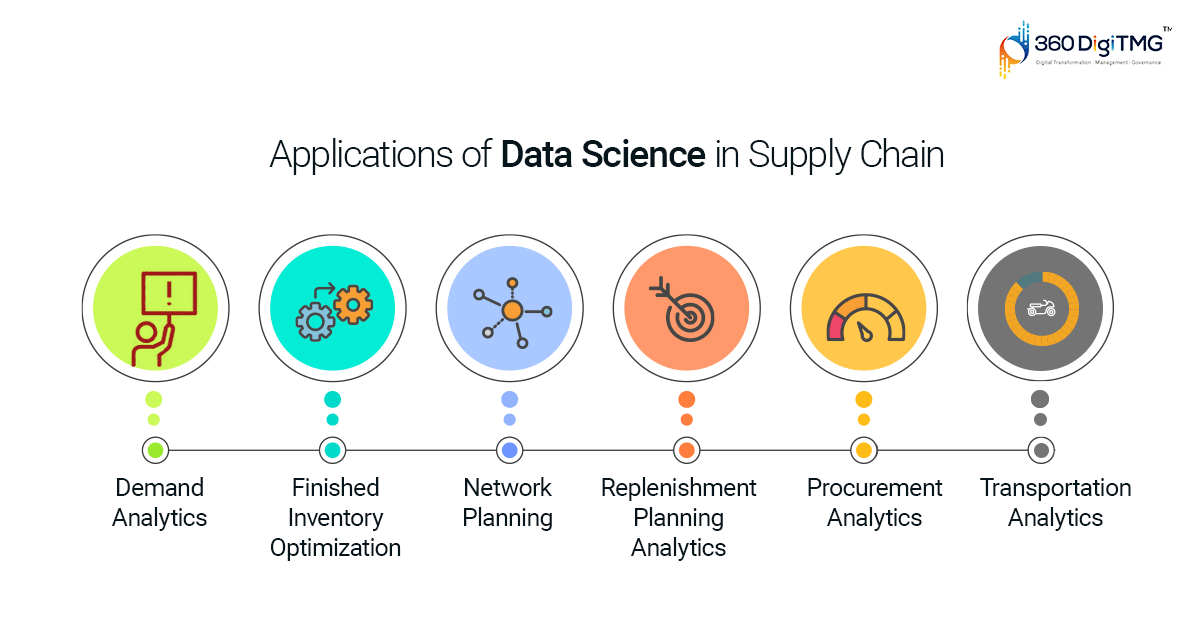Introduction:
Supply chain management is the backbone of any business, ensuring that products and services reach customers in a timely and cost-effective manner. It involves a complex web of processes, from procurement and manufacturing to distribution and logistics. In the past, supply chain management relied heavily on manual processes and intuition. However, with the advent of data science, this field has undergone a significant transformation.
The Role of Data Science in Supply Chain Management:
Data science is the practice of using data to extract valuable insights and make informed decisions. In supply chain management, it plays a pivotal role by leveraging data from various sources to optimize processes and improve decision-making. Here are four key ways data science is making a difference in supply chain management:
Demand Forecasting:
Accurate demand forecasting is essential for managing inventory levels and ensuring that products are available when customers need them. Data science algorithms can analyze historical sales data, market trends, and external factors to generate highly accurate demand forecasts. This enables businesses to optimize inventory levels, reduce carrying costs, and minimize stockouts.
Inventory Optimization:
Maintaining excessive inventory ties up capital and increases storage costs, while insufficient inventory can lead to stockouts and missed sales opportunities. Data science models can help determine the optimal inventory levels based on demand variability, lead times, and other factors. This ensures that businesses have the right amount of stock on hand to meet customer demands without excess.
Route Optimization:
Efficient logistics and transportation are critical components of supply chain management. Data science can analyze historical route data, traffic patterns, and weather conditions to optimize delivery routes and schedules. This not only reduces transportation costs but also ensures on-time deliveries, enhancing customer satisfaction.
Supplier Relationship Management:
Building and maintaining strong relationships with suppliers is vital for a smooth supply chain. Data science can analyze supplier performance data, quality metrics, and other factors to identify potential risks and opportunities for improvement. This allows businesses to make informed decisions about supplier selection, negotiation, and collaboration.
Benefits of Data Science in Supply Chain Management:
The integration of data science into supply chain management offers several benefits to businesses:
Cost Reduction: By optimizing processes and reducing wastage, data science helps lower operational costs, improving the bottom line.
Improved Efficiency: Data-driven insights enable businesses to operate more efficiently, reducing lead times and enhancing overall productivity.
Enhanced Customer Satisfaction: Accurate demand forecasting and on-time deliveries lead to happier customers and increased loyalty.
Risk Mitigation: Data science helps identify and mitigate supply chain risks, such as disruptions in the supply chain or quality issues with suppliers.
Competitive Advantage: Companies that embrace data science in their supply chain management gain a competitive edge by making more informed decisions and adapting to market changes quickly.
Challenges in Implementing Data Science in Supply Chain Management:
While the benefits of data science in supply chain management are substantial, there are challenges to overcome:
Data Quality: Data science relies on high-quality data. Ensuring data accuracy, completeness, and consistency can be a significant challenge.
Integration: Integrating data science solutions into existing supply chain systems and processes can be complex and time-consuming.
Talent Shortage: There is a shortage of data science talent with expertise in supply chain management, making it challenging for businesses to find the right people for the job.
Privacy and Security: Handling sensitive supply chain data requires robust privacy and security measures to protect against data breaches.
Conclusion:
In conclusion, data science is transforming supply chain management by providing actionable insights, optimizing processes, and enhancing decision-making. Businesses that harness the power of data science in their supply chains gain a competitive advantage in today’s fast-paced business landscape. While there are challenges to overcome, the benefits of data science in supply chain management are too significant to ignore. Embracing this technology is not just an option; it’s a necessity for businesses looking to thrive in the modern world of commerce.



